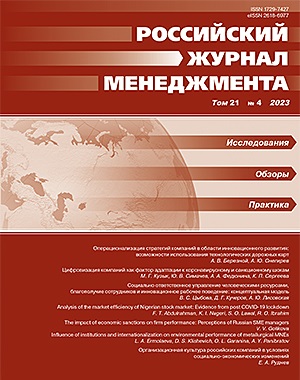Influence of institutions and internationalization on environmental performance of metallurgical MNEs
DOI:
https://doi.org/10.21638/spbu18.2023.406Abstract
Goal: the paper aims to uncover how institutions and internationalization influence the environmental performance of metallurgical multinational enterprises (MNEs). More specifically we pose the following research questions: what is the effect of internationalization and institutions in both home and host market on MNEs environmental performance; whether MNEs mitigate institutional pressure in their home countries by expanding their internationalization.
Metodology: the paper builds on quantitative analysis based on panel data regression. We analyze a dataset of the largest metallurgical MNEs from different countries, covering the period from 2017 to 2020. We focus on metals and mining sector which is a major contributor to the global greenhouse gas emissions.
Findings: we find that internationalization and stringent climate policies in home country are positively associated with environmental performance of metallurgical MNEs. Additionally, we observe that general institutional factors in the home country, such as the protection of minority shareholders also contribute to the environmental advancement of MNEs. Though, the extensive internationalization of metallurgical firms negatively moderates the relationship between stringent climate regulations in the home country and their environmental performance.
Originality and contribution of the authors: our findings indicate that despite the overall trend of improving environmental performance, metallurgical MNEs with a higher proportion of foreign sales exhibit worse environmental performance hinting that they may adopt “carbon haven” logic when faced with stringent climate regulations in their home country.
Keywords:
MNEs, environmental performance, internationalization, 'carbon haven', metal industry, ESG
Downloads
References
References
Downloads
Published
How to Cite
Issue
Section
License
Articles of the Russian Management Journal are open access distributed under the terms of the License Agreement with Saint Petersburg State University, which permits to the authors unrestricted distribution and self-archiving free of charge.





